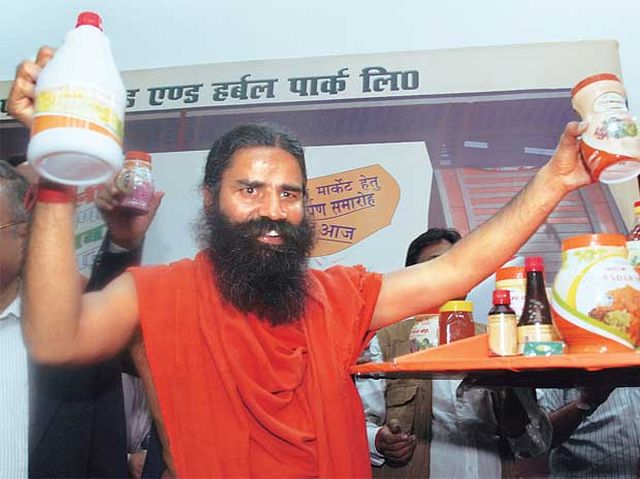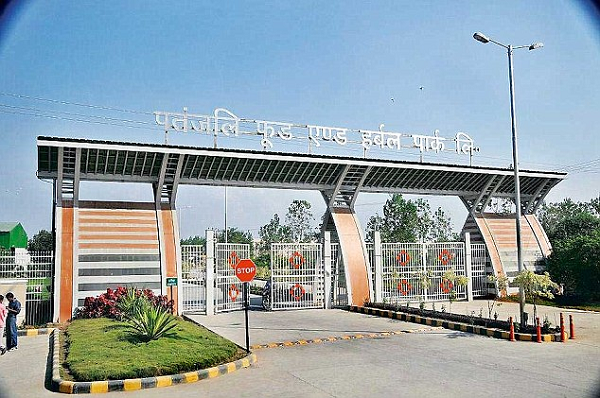
by admin | May 25, 2021 | Branding, Business, Markets, Medium Enterprise, Networking, Online Marketing, SMEs, Social Media, Technology
 By Nishant Arora,
By Nishant Arora,
New Delhi : Yoga guru Ramdev’s “swadeshi” mobile messaging app “Kimbho”, that appeared briefly in May-end claiming to take on the behemoth WhatsApp, has turned out to be a poorly-crafted business idea.
Patanjali, that posted a turnover of Rs 10,561 crore ($1.6 billion) in the financial year 2017, has been retracting its statements since the launch — first asking people to download the app from Google Play Store, then blaming extremely high traffic for its sudden death, later claiming it was just a one-day test and now asking for two more months for its relaunch.
The app disappeared from Google Play Store within a day of its launch on May 31 over security and performance concerns, leaving the country’s tech industry in a bit of shock.|
If you visit Google Play Store today, you will find at least a dozen fake versions of “Kimbho” which is a Sanskrit word and means “How are you?” or “What’s new?” — in the form of messaging app, TV, Status and what not.
The lingering question is: What was the haste to launch an app, touted as a challenge to Facebook-owned WhatsApp that has over tqo billion users globally and 200 million in India?
Famous French security researcher, who goes by the name of Elliot Alderson, called “Kimbho” a security disaster on Twitter. “This @KimbhoApp is a joke, next time before making press statements, hire competent developers… If it is not clear, for the moment don’t install this app,” Anderson tweeted.
In general course, if it is a Beta launch or a pilot run with a select group of users, the app runs for few weeks, the R&D team refines the product, the IT people plug the security loopholes, check the traffic control systems, apply scalable Cloud-based data management solutions and only then would the company push for a full-fledged launch.
“A messaging app like WhatsApp was build and sold to Facebook at the cost of $19 billion whereas the swadeshi Kimbho’s launcher Patanjali, with total net worth of nearly $2.5 billion, has zero contribution on IT solutions; hence the initiative had to flop in the first place,” Anoop Mishra, one of the nation’s leading social media experts, told IANS.
To run a world-class messaging app like WhatsApp requires top-of-the-line IT infrastructure.
“You need a team of Open Source experts, Cloud and content delivery network (CDN) experts, data engineers, an in-house team of core developers, API developers, user interface (UI) developers, in-house testing team and user data simulation team.
“You also need an outsourced hacking team which keeps finding the loopholes in the existing system which was completely missing in ‘Kimbho’ which was a poorly-scripted app,” Mishra contended.
Apart from the technical and programing infrastructure, a good messaging app requires industry-best third-party tools and scalable Cloud hosting servers to handle and respond to real-time database queries of millions of users so that the app survives the inbound traffic.
To build and run a word-class messaging app requires huge investment of time, tech expertise and money — and eventually needs 10 times more investment for handling servers, security issues and data breaches, Mishra noted.
According to Saket Modi, CEO and Co-Founder of cyber security firm Lucideus, companies nowadays are looking at products that are secure by design.
“Companies are moving from agile DevOps to agile DevSecOps, where security is now being thought of from the development phase itself,” Modi told IANS.
Lucideus was responsible for security assessments for apps like BHIM, Whats App for Payments and Google Tez.
According to Faisal Kawoosa, Head, New Initiatives, CyberMedia Research (CMR), it will not be easy for “Kimbho” to create a space dominated by WhatsApp by just being “Swadeshi”.
“The initial reviews are full of issues and concerns,” Kawoosa said.
“Kimbho” should ideally have seen a soft launch — without any comparison with WhatsApp — building on the momentum while deploying scalable, agile and secure Cloud-based solutions to make it run.
Building a world-class app perhaps needs much more effort than making toiletries or food products.
(Nishant Arora can be contacted at nishant.a@ians.in)
—IANS

by admin | May 25, 2021 | Business, Corporate, Corporate Buzz, Large Enterprise, Markets, News
 New Delhi : Riding high on the popularity of desi products, Yoga guru Swami Ramdev said by 2018-19, his fast-moving consumer goods (FMCG) company, Patanjali, will overtake Unilever and others and by 2020-21 Patanjali would become the world’s largest FMCG brand.
New Delhi : Riding high on the popularity of desi products, Yoga guru Swami Ramdev said by 2018-19, his fast-moving consumer goods (FMCG) company, Patanjali, will overtake Unilever and others and by 2020-21 Patanjali would become the world’s largest FMCG brand.
“In the next two years, Patanjali will create Rs 1 lakh crore production capacity. Presently our Haridwar facility has Rs 15,000 crore production capacity and the Tezpur facility has Rs 25,000 crore capacity. Our new facilities are coming up in Noida, Nagpur, Indore and Andhra Pradesh. We have 50 small units where we make edible oils, salt, etc. Even if we attain Rs 1 lakh crore production capacity, it will be hardly 10 per cent of the total market size of Rs 10 lakh crore,” Ramdev told India TV’s Rajat Sharma in the TV show Aap Ki Adalat.
The show will be telecast on Saturday night, according to a press release issued by the channel.
“By 2018-19, Patanjali will overtake Unilever and others as the topmost brand, and by 2020-21 Patanjali plans to become the world’s largest FMCG brand,” he added.
He said he has already prepared a plan of succession for his Rs 10,000 crore Patanjali group, saying that his “successor” will be a team of nearly 500 sadhus trained by him.
The yoga guru, who along with his associate Acharya Balkrishna, has created the massive FMCG group Patanjali within a short span of time, outlined his future plans, while indicating that his group would soon start selling jeans, trousers, kurtas, shirts, suitings, sportswear and yoga wear.
Ramdev also appealed to Finance Minister Arun Jaitley to lower the Goods and Services Tax (GST) on cow ghee and butter, that has been raised from 5 per cent to 12 per cent.
He called for boycott of Chinese and foreign goods, but pushed for export of Indian goods to China and other countries in the same vein.
“The Chinese control almost 50 to 70 per cent of the world market. The Chinese control nearly Rs 20 lakh crore market in India. What is the harm if we try to export our goods to China?”
Ramdev, however, made it clear that the Patanjali group would not try to exploit poor countries. “Whether it is Bangladesh, Nepal, even Pakistan or African countries, whatever profits we will earn, we will not repatriate to India, we will re-invest the money there.”
The yoga guru denied charges that he was getting favours for his group due to his “political connections”.
“I can say with authority that I have not taken a single paisa worth advantage from the Modi government. Nor did I try to obstruct the government’s work. Had I wanted, I could have achieved any dream a politician normally seeks. But for me, politics is not a profession, it’s a mission. I intervened in politics due to exigency (Aaapad dharma) only when I found that bad people (burey log) should not rule any more. I never used, nor will I ever use, my political connections for my company.”
Ramdev said, his Patanjali group has acquired 450 acres of land in Noida by paying Rs 400 crore.
“It was not a gift given to a beggar. I paid 100 per cent for whatever land I bought. In Nagpur, our group paid Rs 25 lakh for setting up an orange juice extraction plant. The government orange juice extraction plant had stopped working. I challenge Unilever, Nestle and others. I am ready to give Rs 12 lakh subsidy, come and set up a plant there.”
The Aap Ki Adalat show with Swami Ramdev was organised at the AIMA convention, and was attended by corporate bigwigs, CEOs of Indian and multinational companies and management experts.
—IANS

by admin | May 25, 2021 | News
 New Delhi, (IANS) The Congress on Tuesday questioned the need to deploy the CISF to guard a food park belonging to Baba Ramdev at Haridwar as the government maintained that it was “no special favour” to the yoga guru or to his manufacturing unit.
New Delhi, (IANS) The Congress on Tuesday questioned the need to deploy the CISF to guard a food park belonging to Baba Ramdev at Haridwar as the government maintained that it was “no special favour” to the yoga guru or to his manufacturing unit.
Answering supplementaries from Congress member Jyotiraditya Scindia in the Lok Sabha, Minister of State for Home Kiren Rijiju said: “We have a long list of 11,000 private enterprises and industries that have been provided with security cover by CISF personnel”.
“You took the name of only one company. It will not be right to say that we have done a favour to one individual or only his firm,” Rijiju said, adding that the decision to deploy Central Industrial Security Force (CISF) personnel at Ramdev’s food park at Haridwar was done following “established procedures and specific inputs from the Intelligence Bureau”.
Following a union home ministry order, the CISF has started providing full-time security cover to the food park from March.
Rijiju said the decision to provide security cover to private enterprises by CISF was taken in 2009 when the law pertaining to CISF personnel was amended by the erstwhile United Progressive Alliance (UPA) regime.
“Moreover, for the private firm you named, we have deployed only 35 CISF personnel. It is the lowest on the table. CISF personnel have been deployed in various private enterprises,” the minister added.
Scindia also wanted to know why Baba Ramdev’s park was provided with CISF personnel, while some airports were denied.
In reply, the minister said that for deployment of CISF personnel in airports a well laid down procedure is followed.
“For example, for Srinagar airport, after assessing the ground reality, the CRPF (Central Reserve Police Force) has been deployed,” Riiju said.
Another Congress member Kamal Nath raised the issue of shortage of CISF personnel, to which the minister said the government will be soon recruiting about two lakh personnel.



